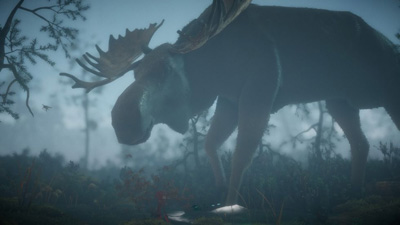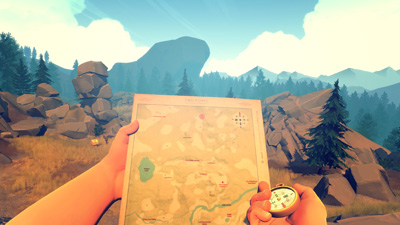Unravel

Limbo is the first thing that comes to mind when playing Unravel, they are both platformers with physics puzzles that are fundamentally driven by their visuals. I didn’t think the puzzles were the strongest part of Limbo, but in Unravel they feel even less prominent – it is mostly a game made out of busywork, applying basic mechanics in obvious ways over and over. Occasionally you’ll see a new mechanic and some times there’s a clever puzzle about traversing the environment while preserving the most yarn possible but most of the time Unravel is an excuse to ferry the player through environments.
And the environments do look good, technically as well as aesthetically. The soundtrack accompanies the levels really well, and while there are some exceedingly frustrating puzzles made difficult by lack of information, unreliable physics or obscure additions to seemingly working solutions, the majority of the design is if not interesting, then at least frictionless to run through. As a content tourist, one could certainly do worse than Unravel.
When Unravel was revealed back at E3 less than a year ago, game director Martin Sahlin talked about the importance of exploring emotions in games – this message is reiterated when the game opens and it is very clear that it was the development focus. And while it’s always nice to see games attempting to say something, there’s not quite the shortage of emotional games that Unravel seems to imply – in recent years there have been quite a lot of them. Unravel goes a bit overboard in stating and re-stating its purpose and it often feels clumsy and on-the-nose rather than emotionally honest. Limbo promoted fear and loneliness with silhouettes and sound effects. Journey took us through the narrative three-act structure without so much as a written word. Brothers managed to use game mechanics to communicate loss and sorrow. I think Unravel would have been a lot stronger if it put more trust in the player and allowed itself to be more subtle with delicate subjects.
It’s a competent game and a technical marvel, but there are better offerings both for the puzzle fans and those looking for interesting narrative experiences.
Firewatch

I normally try to avoid spoilers, but in the end what I write here is to be considered more like the starting-off point of a discussion about the game rather than a recommendation/condemnation for the uninformed players so when my thoughts on a game hinges on the resolution, I will write about that. In short, if you are thinking about playing Firewatch you should do that before reading further – I would recommend that you do if forests, very light discovery gameplay and stories about damaged characters getting to know each other is your thing. It’s got more action than Gone Home, but it’s a similar vein of game.
Firewatch doesn’t do much in terms of gameplay – there’s light flirting with mobility mechanics being introduced to allow more exploration, but there aren’t really any places to explore and little reason to try – I did find a few things off the beaten path but other than very obvious nods they felt disconnected from the larger story. And the story is what Firewatch is about, really – it opens up with some background on why the main character found himself in the job, having escaped from a personal tragedy. The game immediately displays a proficiency with interactive storytelling as the player is free to make choices but are ultimately unable to make the situation better, it feels realistic and sets the tone of the game without spending too much time.
The setup is promising and when you tentatively start talking to your boss over the radio about the choices you made, it feels like a relationship is establishing and the game starts being about that. Then, the game throws some increasingly frightening X-files mysteries at you and the game slowly shifts to being scared and alone in the woods – still well done, though it is difficult to feel spooked by a game that so clearly will never introduce other characters or even animals. My beef is with the resolution – when all is said and done, subplots resolve themselves and the central scary piece of it turns out to be more or less a crazy guy doing his best to go around and scare you.
It was a bit anticlimactic. I admit I may have been placing undue weight on different parts of the plot – the game wants to use the horror element to advance the more personal stories without having to draw attention to the horror itself, and it did not succeed in my case. Maybe if I had made different choices or investigated more objects off the beaten path I would have gotten more out of it. Knowing that it is not going anywhere interesting kind of dissuades me from playing again though, which would be sad if the game is as dynamic as it sometimes seem to be.
I cannot deny having had fun while playing Firewatch though, before I knew how it ended.
The Witness

In a small way writing a public reflection on the Witness feels dishonest – on several levels there is always something you’re not getting, some puzzle you did not even realize was there or some layer of the narrative you had not discerned. This is true for the vast majority of games I play, I suppose, but it calls attention to itself in a game that is more than anything inviting you to discover its secrets.
The Witness has puzzles in the form of mazes, but typically the maze is not in itself the puzzle – it feels more like the language you use to communicate to the game that you have solved the puzzle. Which does not seem like a fundamental difference at first, but it makes the game more about observing the world – witnessing, if you will – and finding patterns. If puzzle games are about the joy you feel when figuring something out, the Witness gives it to you from many different directions and then again when you figure out how it all fits together.
It is mechanically very solid. There are a few frustrating moments with timed puzzles and failed attempts forcing you to re-do earlier mazes, but ultimately this is to discourage the player from trying to brute-force them. On occasion the solution to a puzzle may be finicky to perform even though you have found it, but removing all but the most user-friendly puzzles would make the game less varied.
I don’t pretend to know the depth of its mysteries, but as a puzzle game the Witness is very elegant.
… I don’t usually write about really small games – there are a few different reasons for this but to say a few words about some of the games I played for the last month or so…
Ninja Pizza Girl is a pretty neat precision platform game with multiple paths, sadly the 3D visuals skew perspective a bit and make it less precise than it needs to be. In addition, the anti-bullying message with accompanying game mechanics feel very tacked on and hugely detrimental to the gameplay.
Jotun is a really good looking boss rush game with light exploration in between. It has some gameplay in the levels but the real challenge lies in the bosses that offer some neat action-RPG gameplay bordering in bullet hell at times.
Read Only Memories seems like a pretty straightforward sci-fi adventure game at first, but it later becomes clear that your behavior matters more than figuring out the puzzles. This adds more weight to the central story, a story fundamentally about privilege.
The Aquatic Adventure of the Last Human was much like Jotun, only the areas between bosses are more focused on Metroidvania unlockables than challenges. Both games had solid boss fights, but not very engaging gameplay between them – considering they take a cue from Shadow of the Colossus which had no gameplay between bosses I’m wondering if this is a bad thing.